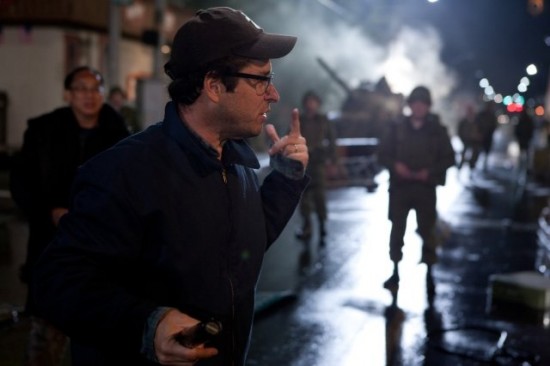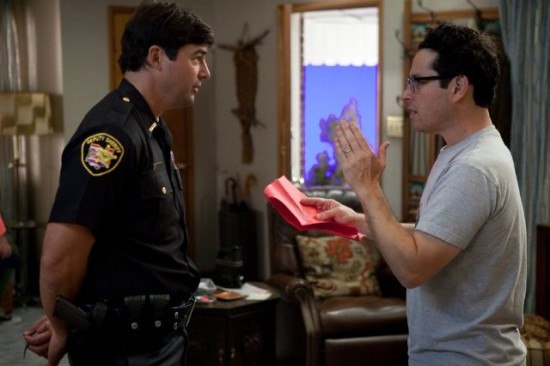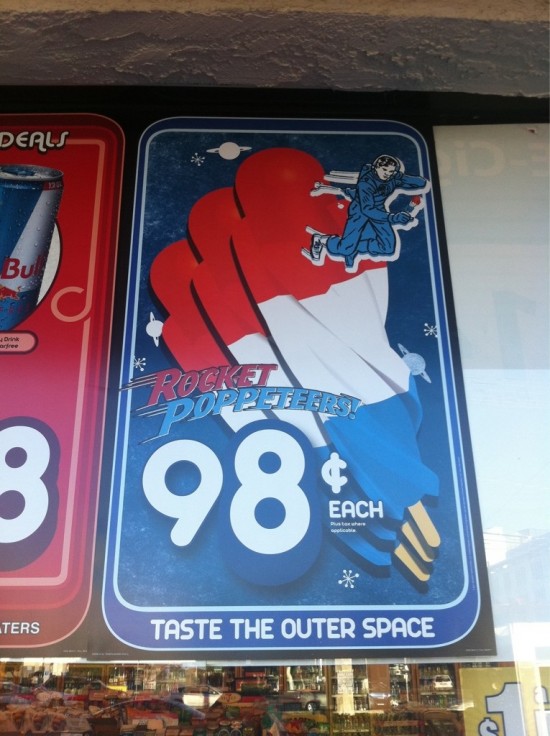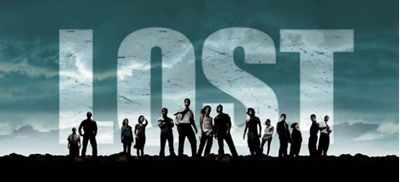/Film Interview: JJ Abrams Talks 'Super 8', Bad Robot, Lens Flares, LOST, Spielberg And The Mystery Box
A couple weeks back I got a chance to get on the phone with director JJ Abrams about his new film Super 8. The interview is spoiler free, so feel free to check it out even if you havent seen the movie yet. We talk more about the film's character-based storyline than the science fiction action, delving into the influences from his own childhood and why Hollywood doesn't make movies about kids anymore. We talk briefly about Steven Spielberg's involvement as a producer, and what that really meant to the film. I get geeky with Abrams, talking about the easter eggs in the film, and even ask him if we'll ever see a movie about the Bad Robot in his production logo. Lastly, I had to ask him about LOST, and find out how much he knew about the smoke monster while he was directing the pilot episode. We also talk about his use of lens flares and the infamous mystery box. Read the whole interview after the jump.
Peter Sciretta: Hey JJ.JJ Abrams: Hey, how's it going?Peter: Good. Loved Super 8.JJ: Thanks, man.Peter: Your film focuses on a son and a father trying to recover from the death of their mother/wife. Spielberg drew the story of ET from divorce. I was wondering where this story sort of came from. What elements did you draw from your own childhood?JJ: Though I haven't lost a parent, the emotional lives of kids are so fraught and deep and complicated. And I just remember being a kid and seeing friends whose parents were getting divorced left and right. My parents are still married. I watched friends who lost parents or who had a single parent. I just remember the complexity of being a kid and all the type of fears that you had about "what if?" You know, what could be sort of the terror of the adult world. And that was the thing that was, for me, kind of the most compelling, which was being a kid and feeling...in a way you could almost kind of quantify the encroaching adult world and the reality that you were, at some point or another, be hit by the adult world stick. So I didn't go through a particular story in that regard as Spielberg did with a divorced family. But the idea of loss and being without a parent. And the thing that I did experience was I had a father who, in a sort of typical 1970's way, was a little bit less involved than I think dads are now. So the idea in my life was if the mother is suddenly gone and this boy didn't have the greatest relationship with his dad, what is that relationship once she's gone? And part of the story was that. Like, what do you do when the primary parent goes away, and how do you reconcile that? How does the father reconcile it? Peter: Definitely. You don't see movies like this anymore. You don't see movies about kids where it's not condescending or a family movie. This is a movie about kids' dealing with complex issues and it doesn't have The Rock as the focal point. Why is it that Hollywood can't make more movies like this?JJ: I have no idea why anything does or doesn't get made. But I feel like there was a kind of movie that I watched when I was younger, which was a movie that had believable characters that made you laugh, that made you comfortable, that then went through something insane and extraordinary and often faced with this genre. And by the end of the movie you didn't just go through something that made you scared, and laugh, and amazed, but also made you emotional and perhaps even made you cry. And there was something about those movies that were simultaneously moving and also fantastical.
Peter: Definitely. You don't see movies like this anymore. You don't see movies about kids where it's not condescending or a family movie. This is a movie about kids' dealing with complex issues and it doesn't have The Rock as the focal point. Why is it that Hollywood can't make more movies like this?JJ: I have no idea why anything does or doesn't get made. But I feel like there was a kind of movie that I watched when I was younger, which was a movie that had believable characters that made you laugh, that made you comfortable, that then went through something insane and extraordinary and often faced with this genre. And by the end of the movie you didn't just go through something that made you scared, and laugh, and amazed, but also made you emotional and perhaps even made you cry. And there was something about those movies that were simultaneously moving and also fantastical.
Those were the kind of movies that I loved. I'm not saying that you can't never try them at all. But there was a kind of movie that I loved when I was a kid where I would be laughing one minute, crying the next minute, I would be amazed the next, and scared the next. And by the time the movie is over I felt like I had been through this sort of roller coaster of various emotions and it was a wonderful, satisfying thing. The goal of Super 8 was to try to make a movie that was not just a comedy, not just a horror movie, not just a science fiction film, not just a love story, not just an emotional family trauma or a weird sort of paranoid thriller, but all of them.
Peter: I think you accomplished that, because most action movies these days you don't care much about the characters. This movie, I could have seen a whole movie in an alternative reality where the train never crashes and it's just a Stand By Me-style drama following the kids and I would have still loved it.JJ: I love that you said that. Thank you so much for that. Peter: You got Steven Spielberg to come on to produce. Other than his name, what did he bring to the film? Do you have any examples of ideas or suggestions that Steven brought to the story?JJ: I've got to say this. One of the great things about Steven was his support in realizing Super 8 the way it was intended, meaning if I had stopped talking with Steven, I'm sure I would have been much more self conscious and reluctant to jump in and make a film that felt like the movies I loved so much as a kid. And, in a way, having the movie literally be a Steven Spielberg Amblin film, it sort of allowed the movie to just embrace the DNA that was very actual to me as a kid that age in that year. So it was kind of a blessing to just kind of work with him on this particular film for that reason alone, but he was also wildly helpful in the development of the story. He was wildly helpful in his opinions towards casting. He was in the editing room with me for hours and hours and just wonderful in that regard. I mean he was a true collaborator and partner in this. It was a privilege to work with him for so many reasons. But one of the largest was it allowed this film to genuinely be an Amblin film. It allowed us to sort of embrace that more and not feel like it was, in any way, apologetic for sharing the spirit of those early films.
Peter: You got Steven Spielberg to come on to produce. Other than his name, what did he bring to the film? Do you have any examples of ideas or suggestions that Steven brought to the story?JJ: I've got to say this. One of the great things about Steven was his support in realizing Super 8 the way it was intended, meaning if I had stopped talking with Steven, I'm sure I would have been much more self conscious and reluctant to jump in and make a film that felt like the movies I loved so much as a kid. And, in a way, having the movie literally be a Steven Spielberg Amblin film, it sort of allowed the movie to just embrace the DNA that was very actual to me as a kid that age in that year. So it was kind of a blessing to just kind of work with him on this particular film for that reason alone, but he was also wildly helpful in the development of the story. He was wildly helpful in his opinions towards casting. He was in the editing room with me for hours and hours and just wonderful in that regard. I mean he was a true collaborator and partner in this. It was a privilege to work with him for so many reasons. But one of the largest was it allowed this film to genuinely be an Amblin film. It allowed us to sort of embrace that more and not feel like it was, in any way, apologetic for sharing the spirit of those early films. Peter: In the movie I saw Kelvin, I saw Slusho. But I didn't see any Rocket Poppeteers. So I'm wondering, are they in the movie?JJ: Oh yeah, they're there. Jeff is wearing a commander shirt. There's a poster in Charles' room. We have a couple little other things hidden in there in the movie. But I'm glad that you caught Slusho.Peter: It was all over that gas station scene.JJ: Some people don't see it at all.
Peter: In the movie I saw Kelvin, I saw Slusho. But I didn't see any Rocket Poppeteers. So I'm wondering, are they in the movie?JJ: Oh yeah, they're there. Jeff is wearing a commander shirt. There's a poster in Charles' room. We have a couple little other things hidden in there in the movie. But I'm glad that you caught Slusho.Peter: It was all over that gas station scene.JJ: Some people don't see it at all. Peter: This might be a strange question, but are we ever going to see a movie about the Bad Robot from your production company logo?JJ: Actually, the bad robot character originated as a children's book idea. My feeling is that I would want to start with that, probably, before we did anything else. We have some animation tests. There's a little maquette they sell.Peter: Yeah, I own one of those. Its awesome.JJ: Yeah, they did a great job with that I thought.Peter: So many people wonder this, so I hope you don't think this is a negative question or anything, but why so many lens flares? What's your obsession with lens flares?JJ: Well, say that there's a...there's no question that I overuse lens flares on occasion. I know that there's a sort of...Peter: It's funny because some scenes have none, but then other scenes are filled with them.JJ: Yeah, it's a weird thing. To me, it's a little bit like on a scene for scene or shot for shot basis where I'm looking for something like there's an opportunity to not necessarily put a [xx 10:49] up in front of a light. The kneejerk reaction from the director of photography is usually...it's usually, "OK, we've got to flatten that light because it's going to flare." I think it's one of those things that you want to make sure that, obviously, it's...To me it's such a cool beautiful image, the light through the glass. There are times that I feel like it sort of adds another kind of smart element, and it's hard to define. But it is a visual taste that I do like. I think there are a couple shots in Super 8 where I just think I should definitely pull back here or there, but I can't help myself sometimes.
Peter: This might be a strange question, but are we ever going to see a movie about the Bad Robot from your production company logo?JJ: Actually, the bad robot character originated as a children's book idea. My feeling is that I would want to start with that, probably, before we did anything else. We have some animation tests. There's a little maquette they sell.Peter: Yeah, I own one of those. Its awesome.JJ: Yeah, they did a great job with that I thought.Peter: So many people wonder this, so I hope you don't think this is a negative question or anything, but why so many lens flares? What's your obsession with lens flares?JJ: Well, say that there's a...there's no question that I overuse lens flares on occasion. I know that there's a sort of...Peter: It's funny because some scenes have none, but then other scenes are filled with them.JJ: Yeah, it's a weird thing. To me, it's a little bit like on a scene for scene or shot for shot basis where I'm looking for something like there's an opportunity to not necessarily put a [xx 10:49] up in front of a light. The kneejerk reaction from the director of photography is usually...it's usually, "OK, we've got to flatten that light because it's going to flare." I think it's one of those things that you want to make sure that, obviously, it's...To me it's such a cool beautiful image, the light through the glass. There are times that I feel like it sort of adds another kind of smart element, and it's hard to define. But it is a visual taste that I do like. I think there are a couple shots in Super 8 where I just think I should definitely pull back here or there, but I can't help myself sometimes. Peter: I have to ask you about Lost. I'm wondering, I'm a huge fan of Lost. I loved the finale. I loved everything from the first season that you were heavily involved with to everything. When you were working on the first season, did you know what the smoke monster was going to be.JJ: We had a lot of discussions about what the thing could be, and we knew that we had a few interesting ideas. It was everything from a creature that had been factored into a security system to...we discussed a bunch of things. All of them kind of had full possibilities. But we also felt like this was a... We wrote the pilot, shot it, edited it, distributed it in 12 weeks. The whole process was so fast. And as we were writing it we discussed things, when we were shooting it we discussed things, when we were cutting it we discussed things, but we didn't have a bible written of what the show would be, like any series. And anyone who tells you otherwise is not being honest. You cannot know every single answer. You have big ideas that gives you a roadmap, and you can have a willingness to take that leap of faith, you are going to find it. But we did not have, in any way, every answer. At the time we knew specific things that we felt it was where the show needed to go. But when you think about things like Ben is not a character in the pilot, we didn't know he was going to show up. But you think of how critical he was and what the others said and what his relationship was to the whole cast. It just shows you how the show, any show, evolves over time. So what Damon and Carlton and the others came up with as they worked on the show was never anything that we could have known after we did the pilot. But you go into it knowing as much as you can and believing that you've got a sense of what there's going to be. What it ends up being is always different, sometimes very close, sometimes as far away as you can imagine from those real ideas. But you go into it with at least a bag of best ideas you've got, but you are well aware that as you travel down that path, if you are lucky enough to stay on the air, that bag of best ideas is going to shift, sometimes entirely.Peter: I guess that's the great thing about a mystery box. What's inside it, until it's revealed, could be anything.JJ: That's exactly right. And often, you don't open that box until you have to, and other times you don't open the box ever. But in the case of Lost, I think that they brilliantly kind of balanced the promise of what it could be with answers about what things were. And the end series allowed the show to be an emotional experience and not a kind of techno-babble mechanical one.Peter: One last quick question JJ. If the end of the world was happening and you knew it, and you were in your office, would you open the mystery box?JJ: [laughs] I'd have to say... I think I'd rather go into the Rapture with the mystery box being closed.Peter: OK. Thank you very much today. I'm really a huge fan of yours.JJ: Peter, I really appreciate it. I love /Film too, so thank you!
Peter: I have to ask you about Lost. I'm wondering, I'm a huge fan of Lost. I loved the finale. I loved everything from the first season that you were heavily involved with to everything. When you were working on the first season, did you know what the smoke monster was going to be.JJ: We had a lot of discussions about what the thing could be, and we knew that we had a few interesting ideas. It was everything from a creature that had been factored into a security system to...we discussed a bunch of things. All of them kind of had full possibilities. But we also felt like this was a... We wrote the pilot, shot it, edited it, distributed it in 12 weeks. The whole process was so fast. And as we were writing it we discussed things, when we were shooting it we discussed things, when we were cutting it we discussed things, but we didn't have a bible written of what the show would be, like any series. And anyone who tells you otherwise is not being honest. You cannot know every single answer. You have big ideas that gives you a roadmap, and you can have a willingness to take that leap of faith, you are going to find it. But we did not have, in any way, every answer. At the time we knew specific things that we felt it was where the show needed to go. But when you think about things like Ben is not a character in the pilot, we didn't know he was going to show up. But you think of how critical he was and what the others said and what his relationship was to the whole cast. It just shows you how the show, any show, evolves over time. So what Damon and Carlton and the others came up with as they worked on the show was never anything that we could have known after we did the pilot. But you go into it knowing as much as you can and believing that you've got a sense of what there's going to be. What it ends up being is always different, sometimes very close, sometimes as far away as you can imagine from those real ideas. But you go into it with at least a bag of best ideas you've got, but you are well aware that as you travel down that path, if you are lucky enough to stay on the air, that bag of best ideas is going to shift, sometimes entirely.Peter: I guess that's the great thing about a mystery box. What's inside it, until it's revealed, could be anything.JJ: That's exactly right. And often, you don't open that box until you have to, and other times you don't open the box ever. But in the case of Lost, I think that they brilliantly kind of balanced the promise of what it could be with answers about what things were. And the end series allowed the show to be an emotional experience and not a kind of techno-babble mechanical one.Peter: One last quick question JJ. If the end of the world was happening and you knew it, and you were in your office, would you open the mystery box?JJ: [laughs] I'd have to say... I think I'd rather go into the Rapture with the mystery box being closed.Peter: OK. Thank you very much today. I'm really a huge fan of yours.JJ: Peter, I really appreciate it. I love /Film too, so thank you!
